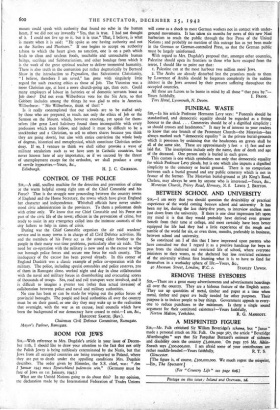CONTROL OF THE POLICE
SIR, —A cold, soulless machine for the detection and prevention of crime or the warm helpful strong right arm of the Chief Constable and his Force? That is the struggle now proceeding between the country towns of England and the Home Secretary, the towns which have given England her character and independence. Whitehall officials have never under- stood civic administration in the provinces. To them a policeman deals with crime only. We know that our Chief Constable and his Force are part of the civic life of the town; efficient in the prevention of crime, but ready to assist in any emergency called into the intimate counsels of the city fathers to help in times of crisis.
During war the Chief Constable organises the air raid wardens' service and in many towns is in charge of all Civil Defence activities. He and the members of his Force act as the strong elder brother to the people in their many war-time problems, particularly after air raids. The need for co-operation with the military is now used as the excuse to wipe out borough police forces and secure one force for each county. The inadequacy of the excuse has been proved already. In this corner of England Dunkirk was a classic example of police co-operation with the military. The police, including special constables and police reserves, 200 of them in Ramsgate alone, worked night and day in close collaboration with the naval and military forces in disembarking and evacuating scores of thousands of troops. Sea, road and rail transport were involved, and it is difficult to imagine a greater test (other than actual invasion) of collaboration between police and naval and military authorities.
No case has been or can be made for wiping out the police forces of provincial boroughs. The people and local authorities all over the country must be on their guard, or one day they may wake up to the realisation that overnight, with the war as an excuse, local councils which have been the background of our democracy have ceased to exist.—I am, &c., HARCOURT SAMUEL (Rev.).


























 Previous page
Previous page